NURS 6501 Week Quiz / NURS6501 Week Quiz: Advanced Pathophysiology
WALDENUNIVERSITY
All 14 results
Sort by
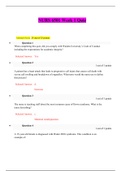
-
NURS6501 Week 1 Quiz,NURS6501 Week 2, NURS6501 Week 3,NURS6501 Week 4,NURS6501 Week 5,NURS6501 Week 6, NURS6501 Week 7, NURS6501 Week 8, NURS6501 Week 9 & NURS6501 Week 10 (2 Latest Versions Each), NURS6501 Week 11 Quiz(3 Latest Versions)
- Package deal • 11 items • 2020
-
- $80.49
- + learn more
NURS6501 Week 1 Quiz,NURS6501 Week 2, NURS6501 Week 3,NURS6501 Week 4,NURS6501 Week 5,NURS6501 Week 6, NURS6501 Week 7, NURS6501 Week 8, NURS6501 Week 9 & NURS6501 Week 10 (2 Latest Versions Each), NURS6501 Week 11 Quiz(3 Latest Versions)
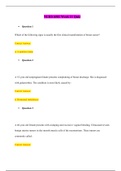
-
NURS 6501 Week 11 Quiz / NURS6501 Week 11 Quiz (3 Versions, Latest): Advanced Pathophysiology (ANSWERS VERIFIED 100% CORRECT)
- Exam (elaborations) • 46 pages • 2020
- Available in package deal
-
- $18.49
- + learn more
NURS 6501 Week 11 Quiz / NURS6501 Week 11 Quiz (3 Versions, Latest): Advanced Pathophysiology • Question 1 Which of the following signs is usually the first clinical manifestation of breast cancer? • Question 2 A 35-year-old nonpregnant female presents complaining of breast discharge. She is diagnosed with galactorrhea. The condition is most likely caused by: • Question 3 A 40-year-old female presents with cramping and excessive vaginal bleeding. Ultrasound reveals benign uterine tumors ...
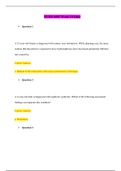
-
NURS 6501 Week 10 Quiz / NURS6501 Week 10 Quiz (2 Versions, Latest): Advanced Pathophysiology (ANSWERS VERIFIED 100% CORRECT)
- Exam (elaborations) • 38 pages • 2020
- Available in package deal
-
- $14.49
- + learn more
NURS 6501 Week 10 Quiz / NURS6501 Week 10 Quiz (2 Versions, Latest): Advanced Pathophysiology • Question 1 A 25-year-old female is diagnosed with urinary tract obstruction. While planning care, the nurse realizes that the patient is expected to have hydronephrosis and a decreased glomerular filtration rate caused by: • Question 2 A 4-year-old male is diagnosed with nephrotic syndrome. Which of the following assessment findings accompanies this condition? • Question 3 A 56-year-old male p...

-
NURS 6501 Week 1 Quiz to NURS 6501 Week 11 Quiz / NURS6501 Week 1 Quiz to NURS6501 Week 11 Quiz (Latest): Advanced Pathophysiology
- Package deal • 11 items • 2020
-
- $80.49
- + learn more
NURS 6501 Week 1 Quiz to NURS 6501 Week 11 Quiz / NURS6501 Week 1 Quiz to NURS6501 Week 11 Quiz (Latest): Advanced Pathophysiology

-
NURS 6501 Week 1 Quiz,NURS 6501 Week 2, NURS 6501 Week 3,NURS 6501 Week 4,NURS 6501 Week 5,NURS 6501 Week 6, NURS 6501 Week 7, NURS 6501 Week 8, NURS 6501 Week 9 & NURS 6501 Week 10 (2 Latest Versions Each), NURS 6501 Week 11 Quiz(3 Latest Versions)
- Package deal • 11 items • 2020
-
- $80.49
- + learn more
NURS 6501 Week 1 Quiz, NURS 6501 Week 2, NURS 6501 Week 3, NURS 6501 Week 4, NURS 6501 Week 5, NURS 6501 Week 6, NURS 6501 Week 7, NURS 6501 Week 8, NURS 6501 Week 9 & NURS 6501 Week 10 (2 Latest Versions Each), NURS 6501 Week 11 Quiz(3 Latest Versions):Advanced Pathophysiology (ANSWERS VERIFIED 100% CORRECT)
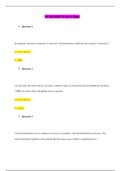
-
NURS 6501 Week 9 Quiz / NURS6501 Week 9 Quiz (2 Versions, Latest): Advanced Pathophysiology (ANSWERS VERIFIED 100% CORRECT)
- Exam (elaborations) • 24 pages • 2020
- Available in package deal
-
- $12.49
- + learn more
NURS 6501 Week 9 Quiz / NURS6501 Week 9 Quiz: Advanced Pathophysiology • Question 1 If a patient’s posterior pituitary is removed, which hormone would the nurse expect to decrease? • Question 2 An aide asks the nurse what is the most common cause of elevated levels of antidiuretic hormone (ADH) secretion. How should the nurse respond? • Question 3 Visual disturbances are a common occurrence in patients with untreated Graves disease. The endocrinologist explains to the patient that the ...
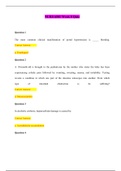
-
NURS 6501 Week 8 Quiz / NURS6501 Week 8 Quiz (2 Versions, Latest): Advanced Pathophysiology (ANSWERS VERIFIED 100% CORRECT)
- Exam (elaborations) • 18 pages • 2020
- Available in package deal
-
- $12.49
- + learn more
NURS 6501 Week 8 Quiz / NURS6501 Week 8 Quiz (2 Versions, Latest): Advanced Pathophysiology Question 1 The most common clinical manifestation of portal hypertension is _____ bleeding. Question 2 A 10-month-old is brought to the pediatrician by the mother who states the baby has been experiencing colicky pain followed by vomiting, sweating, nausea, and irritability. Testing reveals a condition in which one part of the intestine telescopes into another. From which type of intestinal obstruction i...
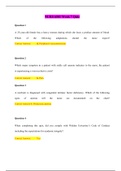
-
NURS 6501 Week 7 Quiz / NURS6501 Week 7 Quiz (2 Versions, Latest): Advanced Pathophysiology (ANSWERS VERIFIED 100% CORRECT)
- Exam (elaborations) • 21 pages • 2020
- Available in package deal
-
- $12.49
- + learn more
NURS 6501 Week 7 Quiz / NURS6501 Week 7 Quiz ( 2 Versions, Latest): Advanced Pathophysiology Question 1 A 25-year-old female has a heavy menses during which she loses a profuse amount of blood. Which of the following adaptations should the nurse expect? Question 2 Which major symptom in a patient with sickle cell anemia indicates to the nurse, the patient is experiencing a vaso-occlusive crisis? Question 3 A newborn is diagnosed with congenital intrinsic factor deficiency. Which of the followi...
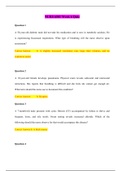
-
NURS 6501 Week 6 Quiz / NURS6501 Week 6 Quiz (2 Versions, Latest): Advanced Pathophysiology (ANSWERS VERIFIED 100% CORRECT)
- Exam (elaborations) • 19 pages • 2020
- Available in package deal
-
- $12.49
- + learn more
NURS 6501 Week 6 Quiz / NURS6501 Week 6 Quiz (2 Versions, Latest): Advanced Pathophysiology Question 1 A 50-year-old diabetic male did not take his medication and is now in metabolic acidosis. He is experiencing Kussmaul respirations. What type of breathing will the nurse observe upon assessment? Question 2 A 10-year-old female develops pneumonia. Physical exam reveals subcostal and intercostal retractions. She reports that breathing is difficult and she feels she cannot get enough air. What t...
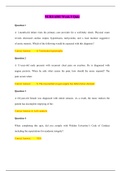
-
NURS 6501 Week 5 Quiz / NURS6501 Week 5 Quiz (2 Versions, Latest): Advanced Pathophysiology (ANSWERS VERIFIED 100% CORRECT)
- Exam (elaborations) • 18 pages • 2020
- Available in package deal
-
- $12.49
- + learn more
NURS 6501 Week 5 Quiz / NURS6501 Week 5 Quiz (2 Versions, Latest): Advanced Pathophysiology Question 1 When completing this quiz, did you comply with Walden University’s Code of Conduct including the expectations for academic integrity? Question 2 A 72-year-old female has a history of right heart failure caused by a right ventricular myocardial infarction. Which of the following symptoms are specifically related to her right heart failure? Question 3 Which is the most common type of congeni...

That summary you just bought made someone very happy. Also get paid weekly? Sell your study resources on Stuvia! Discover all about earning on Stuvia


